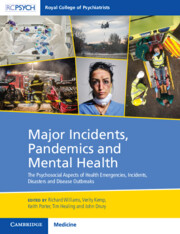 Major Incidents, Pandemics and Mental Health
Major Incidents, Pandemics and Mental Health Book contents
- Major Incidents, Pandemics and Mental Health
- Major Incidents, Pandemics and Mental Health
- Copyright page
- Dedication
- Contents
- Figures
- Tables
- Boxes
- Contributors
- Foreword by Dr Adrian James
- Foreword by Professor David Lockey
- Section 1 The Nature and Impacts of Twenty-First-Century Healthcare Emergencies
- Chapter 1 Emergencies, Incidents, Disasters, Disease Outbreaks, and Mental Health
- Chapter 2 How the World Views Trauma and Trauma Care
- Chapter 3 How the World Views the Mental Health Implications of Traumatic Events, Major Incidents, and Serious Contagious Diseases
- Chapter 4 Two Personal Perspectives on Trauma and Recovery
- Chapter 5 How Emergencies, Incidents, Disasters, and Disease Outbreaks Affect People and Healthcare Practitioners
- Chapter 6 The Impact of Emergencies, Terrorism, and Disease on Children and Their Families
- Chapter 7 The Impacts of Urbanising the World’s Population on Emergencies, Incidents, Disasters, and Disease Outbreaks
- Chapter 8 Myths About Disasters
- Chapter 9 Primary and Secondary Stressors
- Chapter 10 The Differing Challenges Posed by Big Bang, Rising Tide, and Longer-Term Incidents Affecting Local and Dispersed Populations
- Chapter 11 Mental Health in the Context of Multiple Exposures to Disasters
- Chapter 12 The Common Ground in the Mental Health Impacts of Emergencies, Incidents, Disasters, Disease Outbreaks, and Conflict, and a Framework for Responding to People’s Needs
- Section 2 Clinical Aspects of Traumatic Injuries, Epidemics, and Pandemics
- Section 3 The Role of the Public in Emergencies: Survivors, Bystanders, and Volunteers
- Section 4 Responses to Meet the Mental Health Needs of People Affected by Emergencies, Major Incidents, and Pandemics
- Section 5 Sustaining and Caring for Staff During Emergencies
- Section 6 Designing, Leading, and Managing Responses to Emergencies and Pandemics
- Section 7 Key Lessons for the Way Forward
- A Glossary of Selected Key Terms Used in This Book
- Index
Chapter 1 - Emergencies, Incidents, Disasters, Disease Outbreaks, and Mental Health
The Scope of This Book
from Section 1 - The Nature and Impacts of Twenty-First-Century Healthcare Emergencies
Published online by Cambridge University Press: 11 January 2024
- Major Incidents, Pandemics and Mental Health
- Major Incidents, Pandemics and Mental Health
- Copyright page
- Dedication
- Contents
- Figures
- Tables
- Boxes
- Contributors
- Foreword by Dr Adrian James
- Foreword by Professor David Lockey
- Section 1 The Nature and Impacts of Twenty-First-Century Healthcare Emergencies
- Chapter 1 Emergencies, Incidents, Disasters, Disease Outbreaks, and Mental Health
- Chapter 2 How the World Views Trauma and Trauma Care
- Chapter 3 How the World Views the Mental Health Implications of Traumatic Events, Major Incidents, and Serious Contagious Diseases
- Chapter 4 Two Personal Perspectives on Trauma and Recovery
- Chapter 5 How Emergencies, Incidents, Disasters, and Disease Outbreaks Affect People and Healthcare Practitioners
- Chapter 6 The Impact of Emergencies, Terrorism, and Disease on Children and Their Families
- Chapter 7 The Impacts of Urbanising the World’s Population on Emergencies, Incidents, Disasters, and Disease Outbreaks
- Chapter 8 Myths About Disasters
- Chapter 9 Primary and Secondary Stressors
- Chapter 10 The Differing Challenges Posed by Big Bang, Rising Tide, and Longer-Term Incidents Affecting Local and Dispersed Populations
- Chapter 11 Mental Health in the Context of Multiple Exposures to Disasters
- Chapter 12 The Common Ground in the Mental Health Impacts of Emergencies, Incidents, Disasters, Disease Outbreaks, and Conflict, and a Framework for Responding to People’s Needs
- Section 2 Clinical Aspects of Traumatic Injuries, Epidemics, and Pandemics
- Section 3 The Role of the Public in Emergencies: Survivors, Bystanders, and Volunteers
- Section 4 Responses to Meet the Mental Health Needs of People Affected by Emergencies, Major Incidents, and Pandemics
- Section 5 Sustaining and Caring for Staff During Emergencies
- Section 6 Designing, Leading, and Managing Responses to Emergencies and Pandemics
- Section 7 Key Lessons for the Way Forward
- A Glossary of Selected Key Terms Used in This Book
- Index
Summary
This book is about some of the psychosocial aspects of emergencies, incidents, disasters, and disease outbreaks.
My clinical and academic engagement with the mental health consequences of, and responding to emergencies and disasters began when the Herald of Free Enterprise capsized in Zeebrugge Harbour on 6 March 1987, causing the deaths of 193 passengers and crew. Many more people survived; some were injured, and the impacts on the mental health of the survivors became a major long-term issue. I learned a huge amount from patients who were referred to me. This incident occurred relatively soon after the American Psychiatric Association had first included post-traumatic stress disorder (PTSD) in its Diagnostic and Statistical Manual of Mental Disorders (DSM) in 1980. There have been huge developments in science and practice relating to the mental health aspects of disasters in the 37 years that have elapsed since the Zeebrugge ferry tragedy.
- Type
- Chapter
- Information
- Major Incidents, Pandemics and Mental HealthThe Psychosocial Aspects of Health Emergencies, Incidents, Disasters and Disease Outbreaks, pp. 1 - 3Publisher: Cambridge University PressPrint publication year: 2024
